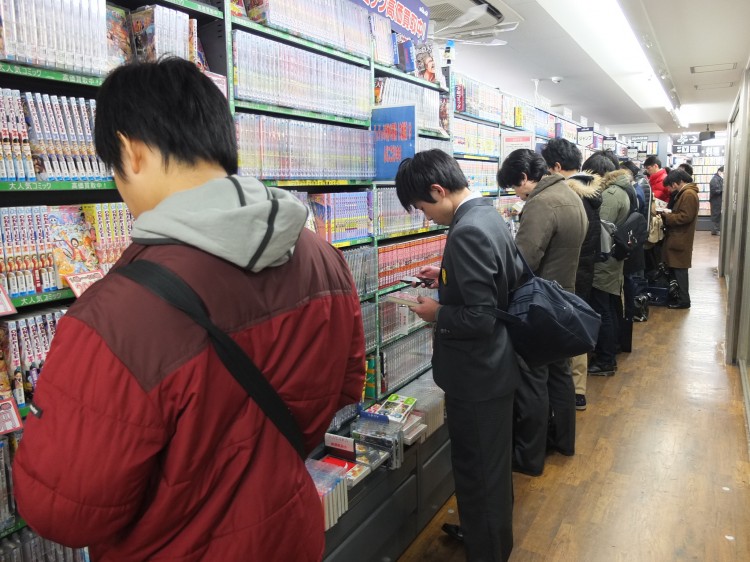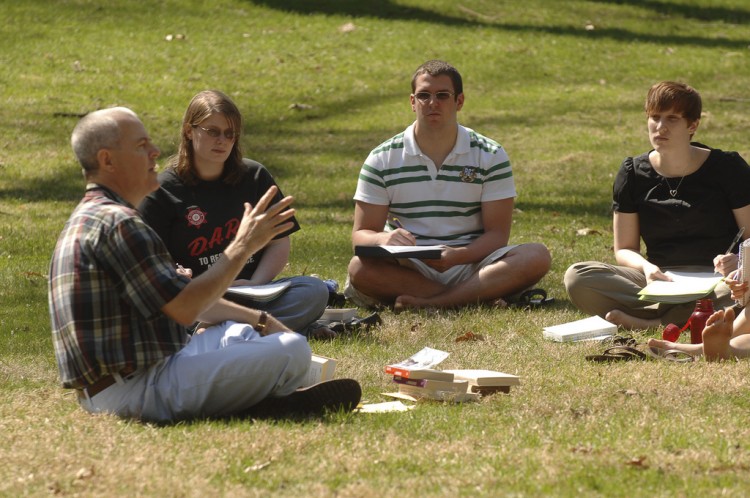
One of the emails we get over and over again is: "I want to become a Japanese translator, what do I need to do?" We have some ideas, but we certainly don't have a lot of experience in this field, so we found people who do and interviewed them. Over the next few weeks we'll be posting interviews with people who have experience with literary translation, technical translation, commercial translation, interpretation, manga translation, and more. You'll hear about these professionals' experiences and learn how to follow in their footsteps, should you want to jump into their fields. For today's interview, I talked to Jocelyne Allen, a 39 year old translator and interpreter to talk about her experiences in the field of literature, commercial translation, interpretation, and manga translation.
Let's see what she had to say!
Q. What fields have you worked in?
Literary translation, freelance translation, interpretation, and manga translation.
Q. How long have you been working in your field?
10 years.
Q. How did you become interested in literary translation?
I've always been a huge reader and my dream job was always to get paid to read books. Once I started working in translation, it was an obvious direction to head in.
Q. What was your first job in the field?
My first literary translation job was probably a short story. I actually can't remember.
Q. What does one need to do to become a literary translator?

You need to love reading. And you need to read a lot in both (all) of your languages. See all the different voices authors have in each language, learn the subtle differences between words.
Q. What are the best schools for this type of translation?
I have no idea. I didn't go to school for translation.
Q. Okay, then for people who are new in this field, how do you find work?
For people new to the field, I'd recommend reaching out to magazines that focus on literature in translation like Words Without Borders. Try to get work on shorter pieces first to establish a reputation and show that you can do the job so that editors will trust you with longer works.
Q. How competitive is literary translation? Do you have any stories about "competition" you've had with other literary translators?
I've never knowingly competed for a job with another translator, although I'm sure before an editor hires me, they are also considering other translators. I think the field is pretty competitive, though, given how little work is published in translation in English.
Q. As someone who has been doing this for a while, how do you find / get work in literary translation?
To be honest, my work now comes from editors and publishers approaching me. I do reach out when I hear about a project I'd like to be a part of, but usually someone contacts me, either because we've worked on other projects together or because someone I've worked with has recommended me to them.
Q. How did you get interested in freelance translation?
I'm assuming by "freelance translation", you mean commercial translation. I basically was interested in translation and commercial work was the easiest to get.
Q. What was your first job as a freelancer?
I worked for a few years in-house with a translation agency before becoming a freelancer, and that relationship continued when I became independent. I still do work for that agency on occasion now.
Q. How do you find jobs as a freelance translator?
Pound the metaphoric pavement. Send your resume out to agencies and direct clients in the field you want to specialize in. Cold call. People will ask you to do translation tests or hire you for small jobs to see how you perform. Make the deadlines and send in quality work and you will get more work.
Q. Is there a lot of work out there for freelance translators?
Obviously, this depends on your field of specialization, but I think there is, in general. Global business needs translations. I do commercial work in the fields of automotives and engineering, and I am always turning work down.
Q. What kind of work do you get as a freelance translator?
Most of the work I get are documents or presentations to be used within the company, with the occasional user's manual or academic paper.
Q. What advice do you have for people who want to become freelance translators?

Be willing to work really hard. For the first couple years (at least) that you freelance, you will probably need to take any and every job that comes your way to build up your reputation and also make enough to pay your rent. Also, working in-house and training under veteran translators for a few years is a great way to learn your craft and earn a steady, risk-free pay cheque at the same time.
Q. Now let's talk about interpretation. How did you become interested in interpretation?
Interpretation got interested in me. Because I translate manga, I ended up being asked to interpret for manga artists.
Q. What was your first interpretation job and what did it entail?
I interpreted at meetings and things while I worked in-house, but my first non-in-house interpreting job was working with a manga artist, basically hanging out with him during the entirety of his visit and speaking for him during public events.
Q. What should someone do if they want to become an interpreter?
Keep your ears sharp. Listen to a lot of stuff in your B language. Practise interpreting it. An interpretation course could help a lot too.
Q. How do you find work as an interpreter today? And what should a new interpreter / someone who just graduated do to get interpreter work?
My work as an interpreter is very focussed on manga, and fortunately, I am known for working with manga artists, so people find me. Volunteering with organizations you're interested in is always a good way to get your name known in the circles where you'd like to interpret. Like, if you're interested in working in manga/anime, see if a local con needs interpretation help.
Q. What would you say are the main differences between translating and interpreting in terms of what skills you need?
Interpreting is very much right now. You need to be able to concentrate and think very fast to interpret. It doesn't matter if you use the perfect word for the situation as long as you use a word that means the right thing. Translation lets you linger (until your deadline at least) on finding exactly the right word to convey the sentiment. You also need to have a certain level of people skills for interpreting, whereas you can be a translator and basically never see anyone ever.
Q. What is the most important thing that someone who wants to go into interpretation should know or do?
Be aware that it can be pretty stressful. And always eat before any dinner where you will be required to interpret. My rumbly tummy has interrupted more than one conversation.
Q. Last topic. Manga! How did you get interested in translating manga?

I love manga and comics, so once I started working in translation, it seemed like the logical next step.
Q. What was your first job in the field?
I started working in BL manga. I can't remember what my first book was.
Q. What is the difference between localization and translation?
Roughly speaking, translation is putting the words in English, while localization is making those English words match the target market English and maybe smoothing the rough translation edges.
Q. How do people normally get into translating manga?
I don't really know. I think everyone's path is different.
Q. How do you get in contact with employers/websites for manga?
Most manga publishers have a "jobs" page or contact form. They'll tell you how to get in touch with them. In the worst case, they'll have a general contact email address. Be very specific in your subject line so that your inquiry goes to the right person.
Q. Does it help to be familiar with current anime and manga? Or does it not matter very much?
I don't know if it helps to be familiar with current manga (I can't speak to anime since I don't work in that field), but it does help to be familiar with manga in general. Knowing the tropes and the styles makes your job a lot easier and your work a lot better.
Q. What programs should you be familiar with, like editing software?
I use Scrivener, especially for longer series or novels, but I deliver my translations in Word documents and I've never had a publisher ask for any other format. So work with whatever software works for you, but make sure you can use Word to check and deliver your final translation.
Q. For someone hoping to work on manga translation, what is the most important thing they should know or do?
Don't miss deadlines. This goes for every kind of translation, though. This is literally the most important thing. (Obviously, your translation should also not be straight out of Google Translate.) The project has a schedule, and the translation is usually the first step in that schedule. So when you miss your deadline, you knock everything down the line off the schedule. If you're not going to be able to make the agreed on deadline, tell your publisher. Schedules usually aren't that tight and something can almost always be worked out. But when you commit to a deadline and you don't meet it, you're basically telling the publisher (or the agency or the direct client) that you are unreliable.

Q. How long did it take for you to learn Japanese and get your first job as a translator?
A few years. I started studying Japanese when I moved there, so I had a bit of a leg up since I was surrounded by the language constantly.
Q. What recommendations or advice do you have for someone who is learning Japanese?
Go to Japan. I know that's not always possible, but immersion is really the best method. So if you can't go there, surround yourself in Japanese. TV, podcasts, books.
Q. What level of the Japanese-Language Proficiency Test (JLPT) would you say you have to pass before being able to work as a translator or an interpreter?
I don't think the JLPT is a good measure of practical ability. I have JLPT Level 1, but I spent a lot of time studying things I've basically never used since to get it. If you want to work with clients in Japan, though, having Level 1 or 2 will make you look more credible.
Q. How can you beef up your resume? Are there any good starting jobs?
Volunteering is a great way to beef up your resume. Agencies can also be a good place to get work when you're first starting out.
Q. What do you find most difficult when translating from Japanese to English? Are there any specific phrases or words that you remember having a difficult time on?
The set phrases are always the hardest. Really common everyday things like "Yoroshiku onegai shimasu" or "ganbaru". Because they mean so many different things in so many different contexts. One thing I remember having the hardest time with was this pun in a manga of rakugo stories. The whole story hinged on this word which meant two totally different things. That story nearly drove me insane.
Q. Should you translate literal meanings or cultural equivalencies? In which situations would one be better over the other?
Context is king. You should always look at your audience, look at the text, look at who is paying you to translate the text. There's no hard and fast rule about this, other than hewing to the literal is usually preferred by commercial clients. But even that's not set in stone.
Q. Is it better to specialize in a certain field like medicine, engineering, automotive, or computer science to get higher quality jobs?
Absolutely. Specialization is key to getting higher-paying, more interesting work.
Q. Can you give some examples of projects you've done along with how long these projects normally take you / the team you're on?
A typical manga project usually takes me about a month, but that's never the only thing I'm working on. Novels take a lot longer. Other projects vary depending on the length of the project itself. I don't work in teams, in the sense that I am translating with anyone. My editor will come back to me with questions or comments, but that's about it.
Q. Do you have any funny or interesting stories from when you were working on something?
I have changed the name of a character halfway through more than once. I'm very bad with names. Fortunately, I always notice in the editing stage and change it back. I also constantly hassle my friends and family with word usage questions. My sister has kids so she often bears the brunt of this as I try to figure out what the kids these days are saying.
Q. How should someone living in Japan find work as a translator?

Pound the literal pavement. Japanese clients really like to meet in person before hiring people. Even if they hire you without meeting you, that relationship will definitely be strengthened by a (scheduled) visit to their office. Face time is very important in Japanese business.
Q. Do you enjoy what you do? What kind of person do you think someone would need to be to enjoy this kind of work?
I love what I do. I can't believe I actually get paid to read all day long. I think to be in translation, you really need to be a person who's comfortable being with themselves and alone with their thoughts. And you need to be a reader. Although I don't know why you'd want to be a translator if you don't like reading.
Q. Is there anything else you'd like to say to someone who aspires to be where you are today?
You might not be able to get work in the field you're most interested in right away, but that doesn't mean you should give up. There are lots of different roads to where you want to go. I studied math at university, worked for a car company as my first translation job, and now I translate manga and fiction full-time. There's no straight line from where I was to where I am.
Thanks for the interview!
Want to know more about translation? Check out our other interviews:
- How to be a Japanese Translator with Jonathan Lloyd-Davies
- How to be a Japanese Translator with Susanna Fessler
